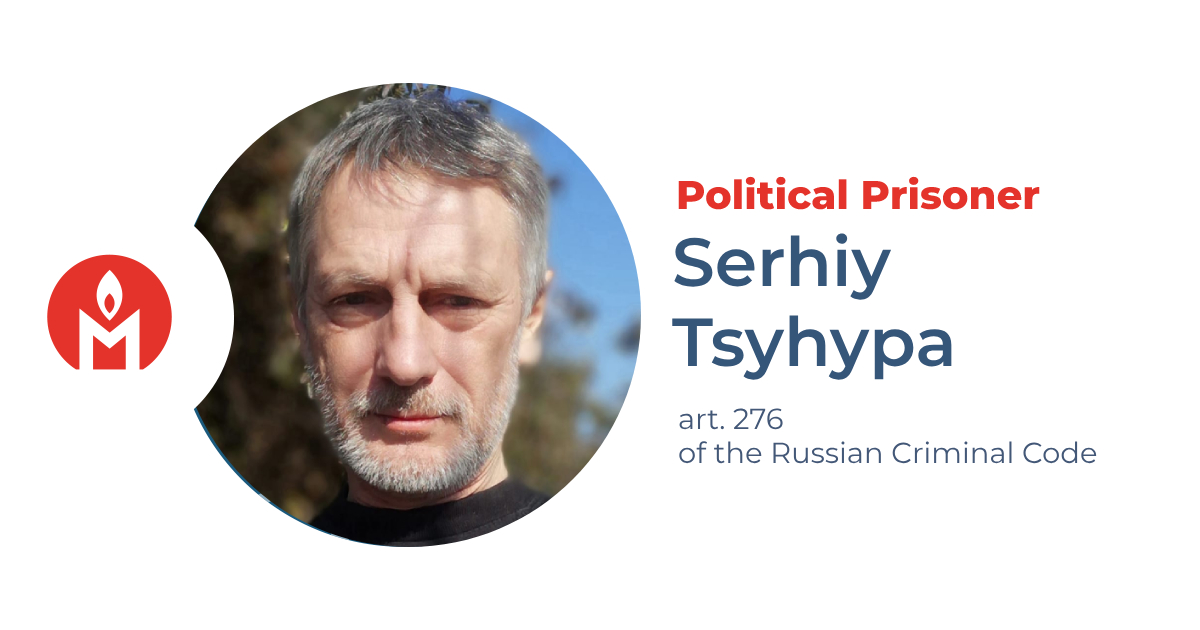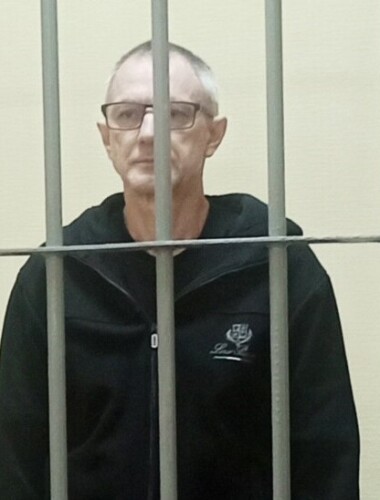Ukrainian activist Serhiy Tsyhypa is a political prisoner
He has been sentenced in occupied Crimea on charges of espionage to 13 years in a strict regime penal colony
The ‘Political Prisoners. Memorial’ human rights project, in accordance with international standards, considers Serhiy Tsyhypa a political prisoner. He is being prosecuted on charges of espionage for allegedly passing information to the Ukrainian military that could be used against the security of the Russian state, but in reality for organising protests against the Russian occupation. Tsyhypa’s prosecution violates his right to fair trial and the prohibition on torture.
We demand the immediate release of Serhiy Tsyhypa, the dropping of all criminal charges against him, and an investigation into the allegations of torture.

Who is Serhiy Tsyhypa and what is the background to his case?
Serhiy Tsyhypa, 62, is a journalist, writer, activist, and veteran of the Ukraine’s Anti-Terrorist Operation from Nova Kakhovka in the Kherson region of Ukraine. After the start of Russia’s full-scale invasion, he engaged in voluntary work, organising rallies in support of Ukraine, and reporting on events in the south of the country.
On 12 March 2022 Tsyhypa went missing. The same day, the Russians captured Oleksandr Tarasov who had organised rallies in Kherson. On his release, Tarasov said that, together with Tsyhypa, he had initially been held in the basement of the building of the Kherson regional government before being moved to a remand prison in Crimea. There Tsyhypa, along with other unlawfully detained Ukrainians, was subjected to ill-treatment and torture.
On 23 April 2022, Russian pro-government Telegram channels published a video in which Tsyhypa talked about ‘provocations against the civilian population’ allegedly carried out by the Ukrainian military.
Tsyhypa’s relatives only obtained official information about his whereabouts in November 2022.
In December 2022, Tsyhypa was charged with espionage (Article 276 of the Russian Criminal Code). He was accused of giving an officer of the Ukrainian Security Service ‘information about the location of a radio relay station that provided communications to the headquarters of the Russian armed forces.’
On 6 October 2023, the Supreme Court of Crimea sentenced Tsyhypa to 13 years in a strict regime penal colony.
Why do we consider Tsyhypa a political prisoner?
The evidence of torture casts doubt on Tsyhypa’s ‘confession of guilt’, which was the main evidence in his prosecution.
The treatment of Serhiy Tsyhypa grossly violates the provisions of the Geneva Convention with regard to the Protection of Civilian Persons in Time of War — the right to physical integrity, humane treatment and fair trial. The very fact that he was imprisoned for nine months without charge or the opportunity to meet a lawyer raises doubts about the credibility of the evidence against him.
Tsyhypa was convicted under Russian law on charges relating to an act committed on the occupied territory of Ukraine. This also contradicts the provisions of the Geneva Convention.
A detailed description of the case of Serhiy Tsyhypa and the position of the ‘Political Prisoners. Memorial’ human rights project are set out on our website.
Recognition of an individual as a political prisoner does not imply the ‘Political Prisoners. Memorial’ human rights project agrees with, or approves of, their views, statements, or actions.
How can you help?
You can write to Serhiy Tsyhypa at the following address:
In Russian: 295051, Республика Крым, г. Симферополь, пер. Элеваторный, 4, ФКУ СИЗО №2 УФСИН России по Республике Крым и г. Севастополю, Цыгипе Сергею Витальевичу, 1961 г.р.
In English: Serhiy Tsyhypa (born 1961), Remand Prison No. 2, Russian Federal Penitentiary Service for the Republic of Crimea and Sevastopol, 4 Elevatorny Lane, Simferopol, Republic of Crimea, 295051.
You can also send an electronic letter via Zonatelecom if you use Russian bank services and via PrisonMail if you use other banks.
Please note that letters in languages other than Russian are highly unlikely to reach the recipient.
You can donate to support all political prisoners on our website.
